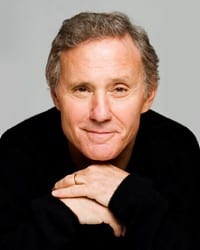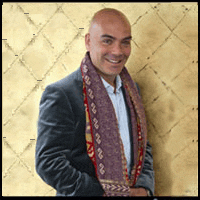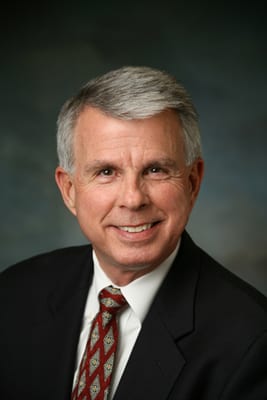 Keeping It Real
Keeping It Real
A Q&A with Ian Schrager
By Stacy Shoemaker Rauen
Ian Schrager is at it again. Yes, the inventor of the boutique hotel is hoping to re-invent the same space he started out in 27 years ago with two new yet-to-be-named brands under his own private hotel company: one for the luxury lifestyle category, and another more reasonably priced (yet stylish) option. The first (he hopes to do 10 to 15 hotels in the next five years) is set to open this fall in Chicago housed in the Ambassador East, one of the city’s most famous cultural icons, once favored by music legends such as Led Zeppelin, Sid Vicious, and Frank Sinatra. And these brands are in addition to Edition, his collaboration with Marriott, the first of which just opened in Waikiki with more planned for Istanbul, Barcelona, London, Mexico City, Miami, and Bangkok. Here, the busy hotelier talks about his new love for simplicity, what he has in common with a Russell Crowe character, and the importance of gracious service.
HD: You recently sold the Gramercy Park Hotel. How did it come about? Why was it a good time?
IS: We were in the middle of recapitalizing it, and I had a lot of plans on my own, working with Marriott on Edition, and doing my own private hotel company again. I think that’s where the focus on my passions was going. And yeah, I just thought it was time to move on and I got an offer for my half that was just too good to refuse.
 HD: Talk to us about your two new brands.
HD: Talk to us about your two new brands.
IS: I see the same opportunity, a little bit above the boutique space that I like to think Steve [Rubell] and I invented 25 years ago with a little hotel on Madison Avenue called Morgans. I think there are hundreds of versions around the world of that now, and every large hotel company is trying to get in there. So I see the same opportunity I saw 30 years ago in the boutique space-only a little bit above and a little bit below. Those spaces are devoid of any ideas and creativity and originality-all the hotels look alike, and there’s no sense of place and no sense of theater. So while everyone’s rushing into that boutique space and it’s getting somewhat crowded, [I’ll be] creating these two brands and going into those segments.
HD: Your first hotel is in the former Ambassador East hotel in Chicago. Why there?
IS: Well, my wife is from Chicago, so that never hurts. And basically I [wanted] to throw back to the old times where I make an acquisition, I do the developing, and I own and operate it. I’m really in an opportunistic business, and I respond to the opportunities. I’ve been looking to do a hotel in Chicago for a long time, but never had the right opportunity, the metrics, the numbers, the physical spaces. It didn’t work for one reason or another. When I went to take a look at this site, I fell in love with it. I loved the building, I loved the history of it, and I loved the location. And I think it’s the kind of building that we love to get involved in because it was languishing. It had seen its better days. It had a real rich history-it was one of the grand dames of Chicago. Everybody loved it. But yet, it wasn’t really doing well. So it was the perfect opportunity for us to bring value to it.
HD: Can you give us any hints of the design?
IS: It’s going to be very simple. I think that’s the catchword now. When I got started in the business with design, there was nobody that was doing it, so therefore we were out there and we were really designing and trying to be innovative and provocative, and trying to get everybody to notice us. Thirty years later, everyone realized that’s good business. Now everybody’s doing it. So, what you’re finding now, even though the rooms are better designed and the public benefits from that, they’re all starting to look alike again. And so I really think now, especially culturally, I am sort of trying to go off and march to my own drumbeat, not follow what everybody else is doing, which is trying to out-design the next guy, and really go back to my roots and do something really simple and self-assured, but something with great style that I really respond to. The kind of simple way that doesn’t overpower you or try to design yourself to within an inch of your life. Because then it feels comfortable; it makes you feel comfortable. You know you’re in a special place. To draw an analogy to it, it would be like having enough time to write a short letter rather than a long one. So really paring everything down.
HD: Where are you looking to develop other locations?
IS: We of course love New York. We have bids in on a couple. And we like LA and Miami and London, places where I went to before, in one of my companies that I had. But really it’s an international business right now, and when we were working on Edition, a lot of the development over the past year or so, because of the economic cycle, was abroad. And I think with the cycle getting better, there are more opportunities domestically. But Europe, Asia, India, and China, those all represent fertile grounds for us.
 HD: Are there going to be any unifying elements?
HD: Are there going to be any unifying elements?
IS: With everything we do, there’ll be a kind of common attitude, common approach, and common sensibility. You know, a certain feel. You have a heightened experience. Those will all always be the same. I mean, in terms of that approach. But they will look differently and they’ll be different because they’ll be different physical plans, and they’ll be in different locations. And I think we have to do things that are always indigenous to the area they’re in. I think giving a sense of place, that’s part of it. One of my issues with other hotels is that if you’re in a hotel in Boston, or if you’re in one in New York or LA or Miami, they all feel the same. You don’t know really what city you’re in, because a lot of those hotels are pulled out of a book of brands and that doesn’t give much opportunity for doing anything outside that type of zone. I don’t want to go to Paris and eat McDonald’s. I want to go to Paris and I want to eat French food and I want to stay in a French hotel. I want to feel like I’m in Paris. And I think that’s what we in the industry need to do, to give that sense of place.
HD: Who do you see as your competitive set?
IS: People always ask me that, and it’s very hard for me to answer because we’re in a vertical market. We don’t fall into the traditional demographic definitions because we’re going after a sensibility. And that could be old or young or rich or poor. In the less expensive brand it’s people of the same sensibility as in the more expensive brand. It’s a little bit like the fashion world, where you have a couture line and you have a ready-to-wear line. There’s a very big price differential but the sensibility of the people buying those things are the same. It’s something I learned from the nightclub business. It’s so funny. Mr. Marriott came to Gramercy Park Hotel just to see it and then when he walked out, he bumped into a Ritz-Carlton customer. So we take from everywhere. Below, above, because it’s that experience, that group of people that are seeking that kind of unique experience.
HD: So the definition of luxury has changed.
IS: Yes, I think it’s evolving and it’s modern. Luxury’s changed. I think wealth has become very accessible. It’s not really such an elite, non-accessible thing like it’s been traditionally. It’s sort of been modernized, and it’s not the same notion of luxury that my grandparents had. I don’t reject that, but it’s just different. It’s a different generation. It’s a different culture, and people are different. So many people have some measure of wealth now that everything is sort of undergoing a change. I think you’re not going to get along anymore just by having this incredible execution. People are not going to just choose hotels anymore because of where they’re located or merely because of the price point they offer. They’re going to go more and more for the better experience.
HD: Waikiki Edition recently opened to great reviews. What niche or need do you think the brand is filling?
IS: I really think that it represents an update to the boutique hotel idea. And I think it’s, again, continuing this thing of having a real simplicity to it, but with really great style. And we really put in a great, modern level of service into it. Not an obsequious service. You know, not ‘How may I help you?’ or all the other kinds of traditional, old-fashioned notions of what great service is. But when you go to it, where it matters and where it counts, you’re really treated with respect and with dignity and with feeling really comfortable. You’re getting taken care of, and with a real graciousness. It’s as if you’re entering into somebody’s home. And I think that that’s what we were able to pull off with Marriott.
HD: Why Marriott?
IS: I think they’re the best and the brightest in the business. They’re the only company that’s run by hotel operators-every other company is run by financial or marketing people. And I think Mr. Marriott is still a student of the business, and he’s 78 years old. He still is enthusiastic about an idea as he was when he first started. All the people at Marriott I really admire. They’re all smart as a whip and disciplined. The whole thing has been really enjoyable for me and I’ve really learned a lot. Before I did eight or nine hotels and I saw five or six or seven hundred versions of them. This time, I didn’t want that to happen. I thought it would be great if we can do something with a really big company and have the wherewithal to really get these things out fast, before other people can take the ideas and start using them. I never did anything on that scale on my own before. So, it was also a very interesting challenge for me, another mountain to climb.
HD: How do you constantly find inspiration for these new ideas?
IS: I’m like a sponge, and everything is a spark for an idea to me. It’s really what I love to do. And I really love to create and develop and build new things. I can see and feel cultural things perhaps before other people can see it. And these things maybe resonate with me before they resonate with other people. I read every magazine I can get my hands on, and I read a lot. I am very curious about everything. Inspiration can come in the most unlikely place. You just see something in ordinary, common, everyday life, and it gives you this impulse for an idea. I don’t know if this is going off the deep end a little bit, but I don’t know if you saw the movie Beautiful Mind with Russell Crowe? In it, there was a scene where they were in a bar and they were all trying to pick up a girl. And then, from that whole process, he came up with a theory challenging Adam Smith’s Wealth of Nations. So it comes from every place.


